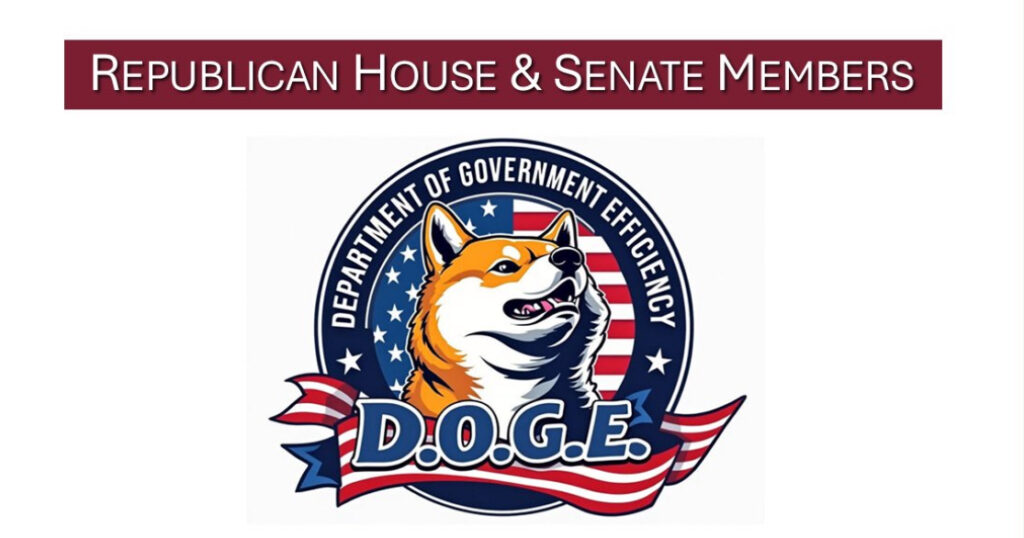Under the collaborative initiative spearheaded by Trump’s Department of Government Efficiency (DOGE), co-leaders Elon Musk and Vivek Ramaswamy are set to engage with Republican lawmakers on Capitol Hill, focusing on government waste reduction. This endeavor follows the establishment of the DOGE Congressional Caucus, launched by Representatives Aaron Bean and Pete Sessions, with additional support from fellow Republicans, including Jeff Van Drew and Ralph Norman. Notably, even Democrats like Jared Moskowitz have joined the conversation, highlighting that the effort to cut ineffective government spending transcends party lines. The assortment of congressional support reflects a bipartisan acknowledgment of the need for reducing waste, leading to the formation of various caucuses both in the House and Senate, aimed at tackling inefficiencies within the federal government.
House Speaker Mike Johnson’s promotion of the upcoming meeting underscores the intention to discuss “major reform ideas” with Musk and Ramaswamy, accentuating themes of regulatory rescissions and administrative reductions. Speaker Johnson credited former President Trump for enabling these discussions and emphasized the principles of limited government which the initiative seeks to revive. The meeting is positioned as a pivotal moment in the concerted effort to reform government operations, aligning influential figures in technology and politics towards a common goal of fostering efficiency and reducing bureaucratic hurdles.
President Trump has announced Musk and Ramaswamy’s leadership of an external advisory committee designed to bring an entrepreneurial approach to government reform. Trump envisions that these efforts will culminate in a streamlined government by July 4, 2026—a landmark that coincides with the 250th Anniversary of the Declaration of Independence. His assertion reflects a long-held aspiration among Republican politicians to pursue objectives that align with the DOGE’s framework, aiming to build a more effective and less bureaucratic federal apparatus. This goal is not merely political rhetoric; it represents a significant shift in government operations, advocating for structural changes that could resonate widely across various sectors.
In a recently published op-ed, Musk and Ramaswamy delineated their vision for the DOGE initiative, emphasizing collaboration with legal experts and advanced technology to address redundant federal regulations. Their approach includes an executive review process for regulations perceived as overreaching or unnecessary, stimulating the economy by liberating businesses and individuals from burdensome rules. The anticipated use of the president’s executive authority to rescind regulations aims to curb what these leaders describe as executive overreach in the establishment of regulations that lack congressional authorization. By instituting this review and nullification process, the initiative posits a legitimate method of restoring constitutional compliance within federal law.
A critical component of the DOGE strategy involves a substantial reduction of the federal workforce in tandem with the eradication of unnecessary regulations. The initiative is determined to recalibrate the number of federal employees to reflect the diminished regulatory landscape. With an eye toward a compassionate transition for affected employees, DOGE proposes strategies such as voluntary severance payments to facilitate smooth exits from the public sector. The emphasis on minimizing bureaucratic overhead accompanies a broader discussion about the feasibility and limits of civil-service protections established to safeguard employees from political repercussions. This aspect of the reform underscores the contentious balance between necessary reductions in public employment and the equitable treatment of workers whose positions may be at risk.
Addressing skeptics who question the potential for significant tax savings through executive action, Musk and Ramaswamy assert that DOGE can indeed curb federal spending, particularly when targeting unauthorized expenditures that are not aligned with congressional intent. They aim to tackle the estimated over $500 billion in annual costs attributed to such expenditures—encompassing government spending that includes various programs and organizations that may no longer align with the original legislative intent. The assertion that certain federal financial practices could be unconstitutional underlines a broader interpretation of presidential authority, suggesting that a supportive judiciary could align with these reform efforts.
As the DOGE initiative continues to develop, updates from the key meetings and the evolving agenda highlight a distinctive reimagining of governmental efficiency through influential partnerships. The momentum behind this program exemplifies a proactive approach to federal reform while navigating the complexities of bipartisan cooperation and executive authority. This endeavor may set the stage for a significant transformation in the relationship between the federal government and its citizens, as Musk and Ramaswamy’s vision seeks to create a more accountable, agile, and fiscally responsible government structure.

